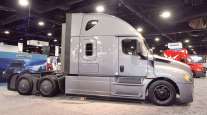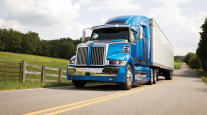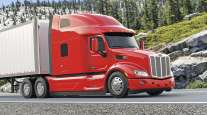Senior Reporter
Class 8 Sales in December Slip, but Soar for Full-Year Period
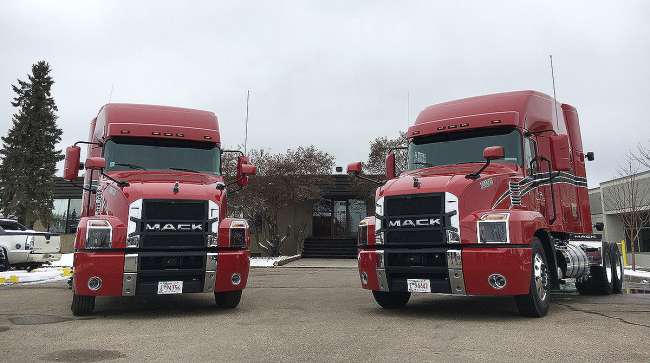
[Stay on top of transportation news: Get TTNews in your inbox.]
U.S. Class 8 retail sales in December dropped 11.4% compared with a year earlier, but for the full year posted the highest annual sales since 2006, WardsAuto.com reported.
December’s total was 23,119, down from 26,083 a year earlier.
Only three truck makers notched more sales in the month compared with a year earlier.
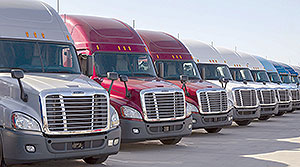
Freightliner posted lower sales of 7,634, down 15.4% compared with a year earlier. (Freightliner)
Higher sales came at Peterbilt Motors Co., up 15.6% to 3,839. Peterbilt is a unit of Paccar Inc.
Mack Trucks, a unit of Volvo Group, rose 13.7% to 3,018.
Western Star, a brand of Daimler Trucks North America, jumped 37.4% on sales of 775 trucks.
DTNA is also the parent of market leader Freightliner, which posted lower sales of 7,634, down 15.4% compared with a year earlier.
For the full year, sales hit 276,348, up 10.3% compared with 250,545 in the 2018 period. In 2006, total sales hit 284,008, according to Wards.
ACT Research has been “quite consistent” in its call for a significant downturn this year, and embedded in that expectation was an improvement to come beginning in the second half of the year, ACT Vice President Steve Tam said.
“Now, it is third quarter/fourth quarter when we will get to the point where we do see the industry getting a lot closer to equilibrium in terms of the amount of equipment out there and the amount of freight to be hauled. Then that will be what sets up the climb up the wave on the next cycle,” Tam said.
ACT’s forecast calls for 190,000 U.S. Class 8 sales in 2020.
Another industry analyst said the monthly number came with mixed implications.
“December reflects there is still demand out there, but it also reflects the softening and the weakening in the freight market at this point,” said Don Ake, vice president of commercial vehicles at FTR.
December’s sales were not high enough to lower the overall Class 8 inventory number, Ake said, and so that high level going into 2020 is an issue “that can have an impact on first-quarter production.”
Meanwhile, reports of layoffs at some truck makers surfaced as the new year began.
Radio station WBEX reported that employees at Kenworth Truck Co.’s Class 8 assembly plant in Chillicothe, Ohio, say they’ve been told by plant officials that approximately 188 people will be laid off by Jan. 31.
Kenworth is a unit of Paccar, and Paccar spokesman Ken Hastings told TT, “We respectfully decline to comment.”
In December, Kenworth posted year-over-year sales of 4,148, down 8.1%.
Mack announced that layoffs are scheduled to begin at the end of February.
“The industry is continuing to manage through a period of excess inventory and reduced demand and as a result, we will unfortunately have to lay off about 305 employees at our Lehigh Valley Operations facility in Macungie, Pa, effective after the close of business on Feb. 28. We will be able to offer voluntary layoffs to about 75 of the 305. Outplacement support meetings led by the company and UAW representatives will be provided for all affected employees,” Mack spokesman Christopher Heffner said.
“We regret having to take this action, but we operate in a cyclical market, and after two years of extremely high volumes, we have to adapt to reduced market demand. Our current forecast for 2020 is a nearly 30% drop in the market, and this reduction is a step in our continued adaptation to market conditions,” Heffner added.
Volvo Trucks North America, also a brand of Volvo Group, saw sales fall to 1,993, down 33.2% from the 2018 period.
Ake said the layoffs are no surprise.
“They are just the result of things getting down to the truck manufacturers’ production line level. They took days off in December. Once you get into the first quarter, you are not going to take days off, you are going to take people off,” Ake said.
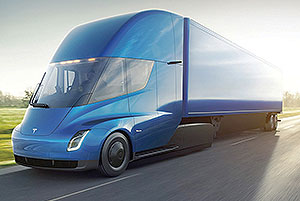
Tesla Semi by Tesla Inc.
Meantime, Tesla reported in a letter to a reservation holder its Class 8 Semi will begin “limited production” of the battery-electric truck by mid-2020.
The company said it had spent the past months testing the Semi in real-world conditions, including curb strikes, potholes and severely degraded roads. Tesla is gearing up for several weeks of winter testing “to validate the truck’s performance in cold weather and low-traction conditions.”
Full production is slated to start in 2021, according to the Tesla letter, which a recipient posted to Twitter.
International, the brand of Navistar Inc., fell the most in December, dropping 43.6% to 1,702 trucks compared with a year earlier.
Want more news? Listen to today's daily briefing:


